Chinese Ginseng roots
Spec: White ginseng roots and slices, Red ginseng roots and slices.
Package: 20kgs/carton
We can supply the ginseng products all the year around.
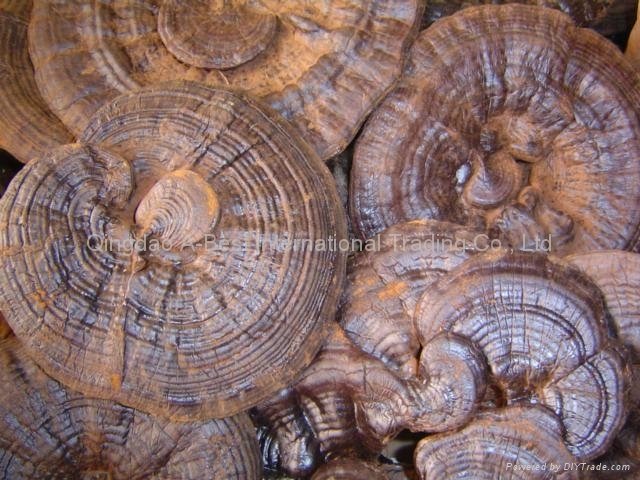
Ganoderma Lucidum ( Reishi )
Reishi (Ganoderma Lucidum), commonly known as Ling Zhi in Chinese, is a herbal mushroom known to have miraculous health benefits. Since ancient times, the Reishi mushroom was reserved for emperors and royalties. It has been revered as natures rarest and most beneficial herb. In the
Superior
category of Shen Nung Ben Cao Jing, the oldest and most famous medical text on Oriental herbal medicine, red Reishi is ranked as the number one herb.
Reishi is an important herb in traditional Chinese medicine in helping the body maintain this balance and also restore the balance when one is sick. It is non-toxic and can be taken daily without producing any side effects. When it is taken regularly, it can restore the body to its natural state, enabling all organs to function normally. It is like an immune modulator that regulates and fine tunes the immune system.
Red Reishi is primarily composed of complex carbohydrates called water-soluble polysaccharides, triterpeniods, proteins and amino acids. Researchers have identified that water-soluble polysaccharides are the most active element found in Red Reishi that have anti-tumour, immune modulating and blood pressure lowering effects.
Another major active ingredient found in Red Reishi are triterpenes , called ganoderic acids. Preliminary studies indicated that ganoderic acids help alleviate common allergies by inhibiting histamine release, improve oxygen utilization and improve liver functions. Triterpenes are bitter in taste and the level of the triterpene content contained in a product can be determined by the bitterness.
Regular consumption of red Reishi can enhance our body's immune system and improve blood circulation, thus improving better health conditions. Generally, Reishi is recommended as an immune modulator and a general tonic. Red Reishi is also used to help treat anxiety, high blood pressure, hepatitis, bronchitis, insomnia, diabetics and asthma.
A considerable number of studies in
Japan
,
China
,
USA
, and the
UK
in the past 30 years have shown that the consumption of red Reishi has been linked to the treatment of a vast range of diseases, common ailments, and conditions. From asthma to zoster, the applications of red Reishi seem to be related to a multitude of body organs and systems.
However, most of the scientific research that has been conducted appears to strongly support red Reishi's role as a normalizing substance - a nutritional supplement that can yield medical benefits through its normalization and regulation of the body's organs and functions. That is why it is ranked as the number one herb in Traditional Chinese Medicine, which focuses on disease prevention by sustaining the right balance within the body through proper nutrition, exercise, and meditation.
Ganoderma lucidum spore powders are the seeds of Ganoderma lucidum, which contain their essences. Ganoderma lucidum spore powders are egg-shaped, brown, diameter in 4-8 micrometer. Ganoderma lucidum spore powders are ejected and collected during Ganoderma Lucidum spore maturity. Each Ganoderma Lucidum only result infinitesimal quantity of spore powder. Modern researchers found Ganoderma Lucidum spore powder can enhance circulation system, liver detoxification, regulate metabolism, and boost immune system. Its distinctive functions include prevention of adenoma and senile diseases, and anti-aging.
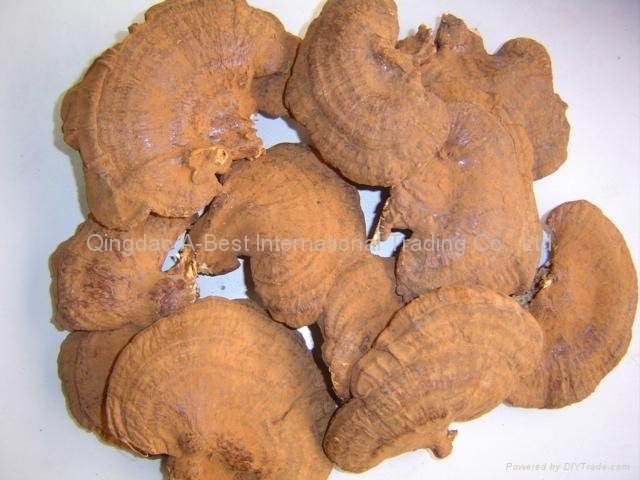
Ganoderma lucidum--REISHI
Reishi (Ganoderma Lucidum), commonly known as Ling Zhi in Chinese, is a herbal mushroom known to have miraculous health benefits. Since ancient times, the Reishi mushroom was reserved for emperors and royalties. It has been revered as natures rarest and most beneficial herb. In the
Superior
category of Shen Nung Ben Cao Jing, the oldest and most famous medical text on Oriental herbal medicine, red Reishi is ranked as the number one herb.
Reishi is an important herb in traditional Chinese medicine in helping the body maintain this balance and also restore the balance when one is sick. It is non-toxic and can be taken daily without producing any side effects. When it is taken regularly, it can restore the body to its natural state, enabling all organs to function normally. It is like an immune modulator that regulates and fine tunes the immune system.
Red Reishi is primarily composed of complex carbohydrates called water-soluble polysaccharides, triterpeniods, proteins and amino acids. Researchers have identified that water-soluble polysaccharides are the most active element found in Red Reishi that have anti-tumour, immune modulating and blood pressure lowering effects.
Another major active ingredient found in Red Reishi are triterpenes , called ganoderic acids. Preliminary studies indicated that ganoderic acids help alleviate common allergies by inhibiting histamine release, improve oxygen utilization and improve liver functions. Triterpenes are bitter in taste and the level of the triterpene content contained in a product can be determined by the bitterness.
Regular consumption of red Reishi can enhance our body's immune system and improve blood circulation, thus improving better health conditions. Generally, Reishi is recommended as an immune modulator and a general tonic. Red Reishi is also used to help treat anxiety, high blood pressure, hepatitis, bronchitis, insomnia, diabetics and asthma.
A considerable number of studies in
Japan
,
China
,
USA
, and the
UK
in the past 30 years have shown that the consumption of red Reishi has been linked to the treatment of a vast range of diseases, common ailments, and conditions. From asthma to zoster, the applications of red Reishi seem to be related to a multitude of body organs and systems.
However, most of the scientific research that has been conducted appears to strongly support red Reishi's role as a normalizing substance - a nutritional supplement that can yield medical benefits through its normalization and regulation of the body's organs and functions. That is why it is ranked as the number one herb in Traditional Chinese Medicine, which focuses on disease prevention by sustaining the right balance within the body through proper nutrition, exercise, and meditation.
Ganoderma lucidum spore powders are the seeds of Ganoderma lucidum, which contain their essences. Ganoderma lucidum spore powders are egg-shaped, brown, diameter in 4-8 micrometer. Ganoderma lucidum spore powders are ejected and collected during Ganoderma Lucidum spore maturity. Each Ganoderma Lucidum only result infinitesimal quantity of spore powder. Modern researchers found Ganoderma Lucidum spore powder can enhance circulation system, liver detoxification, regulate metabolism, and boost immune system. Its distinctive functions include prevention of adenoma and senile diseases, and anti-aging.
Ganoderma Lucidum SLICES
Ganoderma Lucidum ---Reishi has been used for more than 4000 years in Traditional Chinese Medicine. Ganoderma Lucidum is a popular Chinese mushroom with an impressive array of reputed health benefits, including antioxidant properties. The dried powder of reishi was popular as a cancer chemotherapy agent in ancient China. Ganoderma lucidum is also known as Reishi- Lingzhi - or Ling Zhi. it contains numerous substances including polysaccharides that stimulate spleen cell proliferation and cytokine expression. Reishi also contains lanostanoids and triterpenes such as lucidenic acid. and it contains more than 100 substances many of which are known for their ability to support our immune defenses. Planetary Formulas Full Spectrum Reishi Mushroom combines a highly concentrated extract of the fruiting body with the mycelia biomass, to ensure that every bit of reishi activity is present and easily assimilable.
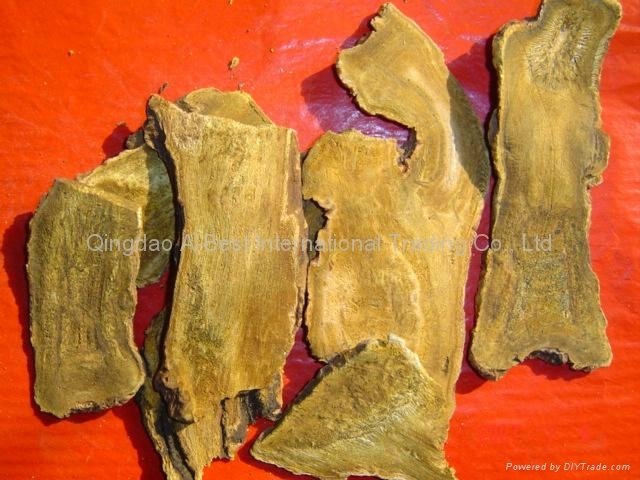
Rhubarb roots and slices
Latin Plant Name:Rheum Palmatum
Common English Name:Rhubarb
Part of Plant Used:Root
Nature:Cold
Taste:Bitter
Meridians Entered:Stomach, Large Intestine, Liver
Common Usages:
This herb is used in formulas to treat symptoms of high fever, excessive sweating, thirst, constipation, bloating, pain, jaundice, high blood pressure, hemmorhage, no menstruation, immobile abdominal masses, and hot, swollen, painful eyes (TCM: internal heat/damp-heat conditions and stagnant Blood); also used to treat skin burns, worms, edema and delirium.
Traditional Usages and Functions:
Drains heat and moves stool; drains damp heat; drains excess heat from Blood; invigorates Blood and breaks up congealed Blood; clears heat obstructing Blood level; clears heat and detoxifies fire poison.
Common Formulas Used In
Apricot Seed and Linum; Bupleurum and Dragon Bone; Cimicafuga; Dianthus; Leonuris and Achyranthes; Rhubarb and Scutellaria.
Cautions in Use
Use with caution during pregnancy and immediately after birth. Do not use where there are exterior imbalances, deficient Qi or Blood, or cold-deficient Spleen and Stomach.
Cooking for more than 10 minutes will reduce its purgative effect. For purgative effect use raw da huang. For blood invigorating action use wine or vinegar treated da huang. For stop bleeding use charred da huang.
Specification: roots, slices, powders
Package: bags or ctns

Ginkgo Biloba Leaves
Spec: Roasted dry leaves,sun dry leaves,Natural drop leaves
Package: 50kgs/bale
We can supply the ginkgo leaves all the year around.
Latin Plant Name:Ginkgo Biloba
Common English Name:Ginkgo Nut
Part of Plant Used:Seed
Nature :Neutral
Taste:Sweet, bitter
Meridians Entered:Lungs, Kidneys
Common Usages:
Gingko seeds are used to treat chronic coughs, asthma, tuberculosis, bladder infections, frequent urination, and leukorrhea (TCM: deficient Lung Qi; deficient Kidney yin; damp heat).
Traditional Usages and Functions
Consolidates Lung Qi, strengthens Lungs, and relieves wheezing and coughing; expels phlegm; astringes damp heat and stops discharges; stabilizes Lower Burner.
Common Formulas Used In
Gingko seeds are more properly considered a food and are used alone, raw or cooked, as a nutritional supplement. They are also used in capsule form as a supplement to formulas that treat coughing and asthma, such as Ma Huang.
Gingko root is most often used to treat chronic cases of involuntary ejaculation.
Gingko leaves, in capsule or tablet forms, are renowned for their effectiveness in treating a wide variety of cerebral and circulatory problems, including migraine headaches, vertigo, memory dysfunction, stroke, coronary thrombosis, and Alzheimer's disease.
Cautions in Use:
Do not use where there are excess cold-damp symptoms. The kernels are mildly toxic and should not be taken either in large quantities or over a long period of time. Use cautiously and in small doses with children. (Consultation with a practitioner is recommended.) The root and leaves are not toxic.
Zanthoxylum Linn , Pericarpium Zanthoxyl
Specification: 70%,75%,80%,85%,90%,95%
Packing: 25kgs/bag ,30kgs/bag
We can supply Sichuan pepper, Shandong pepper etc. all the year around.
Semen Armeniacae Amarum (Bitter Apricot Seed)
Package; 30kgs/bag, 40kgs/bag or 50kgs/bag
Radix Salviae Miltiorrhizae
(英) Dan一ShenRoot
Salviae Miltiorrhizae
Latin Plant Name:Salviae Miltiorrhizae
Pinyin Mandarin Name:Dan Shen
Common English Name:Salvia
Part of Plant Used:Root
Nature:Slightly cold
Taste:Bitter
Meridians Entered:Heart, Pericardium, Liver
Common Usages:
This herb is used in formulas to treat symptoms of tumors, acne, boils, skin sores, menstrual irregularity and absence, endometriosis, fibroids, insomnia, irritability, or palpitations (TCM: Blood stasis with heat); also used for its tranquilizing effects, and to treat coronary heart disease in combination with other specific herbs.
Traditional Usages and Functions:
Invigorates Blood and breaks up congealed Blood; clears heat and soothes irritability.
Cautions in Use:
Do not use during pregnancy. Use with caution where there are no symptoms of congealed Blood.
Specification: Roots, Slices and Powders .
Astragali
Latin Plant Name : Astragali; Astragalus
Common English Name: Milk Vetch Root
Part of Plant Used :Root
Nature :Slightly warm
Taste :Sweet
Meridians Entered :Spleen, Lungs
Common Usages :
Most often used to stimulate immune-system function and enhance or speed healing and/or draining where there is edema, pus formation, or chronic ulceration (TCM: treats deficienry ofQi and most other deficient conditions except deficient-yin syndromes with heat signs); also used to treat debilitating excessive sweating with accompanying weakness (TCM: tonifies Qi and helps close pores).
Traditional Usages and Functions:
Tonifies Spleen and benefits Qi; raises the Yang Qi of the Spleen and Stomach; strengthens the exterior (the body's first line of defense) and stops sweating; promotes urination and removes edema; promotes healing and discharge of pus; tonifies Qi and Blood.
Specification: whole roots, slices ,cuts, powder etc.
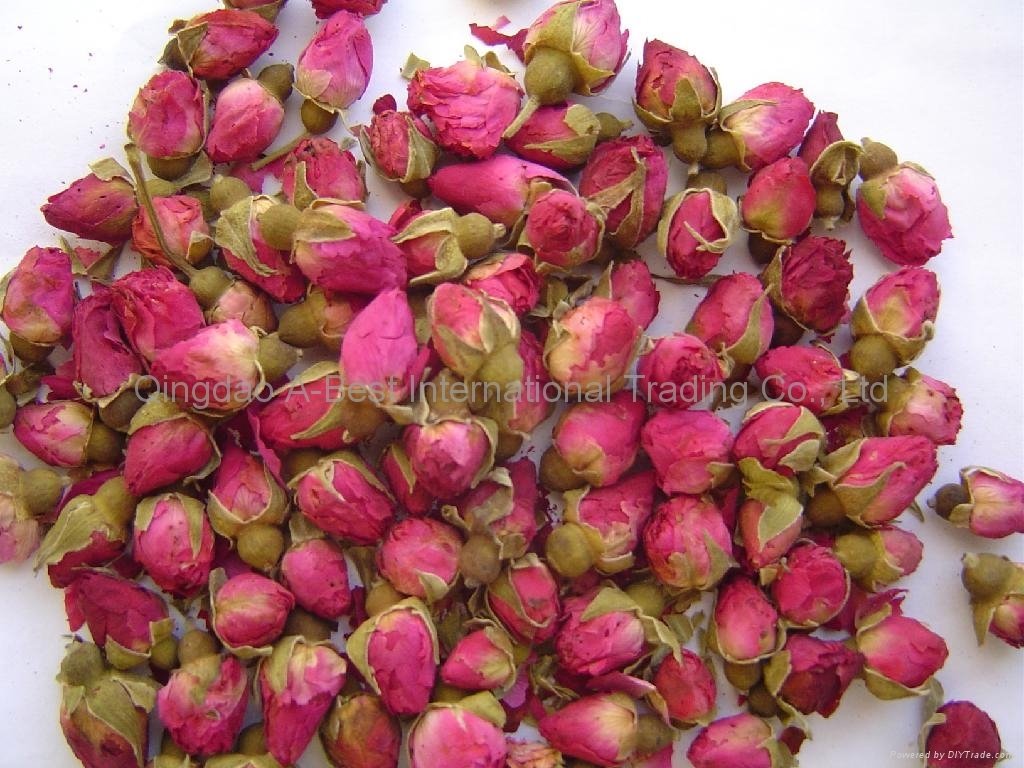
Dried Rose Buds (Rose whole flower) of China origin
Specification: hand picked ,export standard
Origin: Shandong, Gansu
Package: 10kgs/carton, inner with bag
Latin Name: Rosa rugosa
Moisture: <12%
Size: Whole
Taste & Odor:Characteristic
Shelf Life: 2 years when properly stored
Storage: Cool, dry, and ventilative place
Usage: as tea or medicine
Usage and function:
1.It has many usages such as seasoning, medicinal, cosmetics, decorating, food industries and herbal tea. 2. It is one kind of precious medical herbs, with the function of beauty your skin, activating collaterals, softening vessels, also good for cardiovascular, high blood pressure, heart disease and gynecologic. In the "Compendium of Materia Medica" also has discussed its active effects for liver, spleen and stomach. It can calm the nerves and heart ,promote the blood circulation ,beautifying and nourishing face. long-term using also contribute to the metabolism, and with body fragrance . 3. It is very good and edible food. Women usually put it into hot water for drinking, it has many advantages, especially good for their mood and look during the special period each month, it can even relieve the symptom of dysmenorrhea.
Safflower
Latin Plant Name: Carthami Tinctorii
Common English Name:Safflower
Part of Plant Used:Flower
Nature:Warm
Taste:Acrid
Meridians Entered:Heart, Liver
Common Usages:
This herb is used in formulas to treat menstrual imbalances and pain, lack of menstrual blood flow, postbirth abdominal pain, and traumatic injuries (TCM: stagnant and congealed Blood).
Traditional Usages and Functions
Invigorates Blood and promotes menstruation; dispels Congealed Blood and alleviates pain; harmonizes Blood.
Cautions in Use: Do not use during pregnancy.
Origin: xinjiang,China
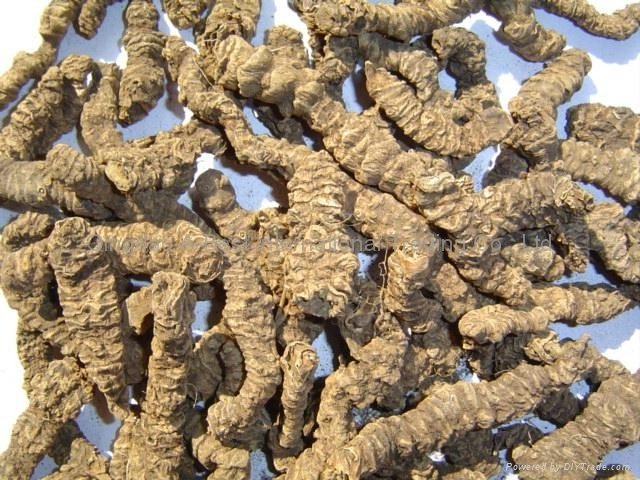
Rhizome Valerianae, Radix Valerianae
1. Effect on CNS: Xie cao (valerian) possesses a sedative effect and is frequently used as a sedative. It can enhance the inhibition of the cortex of the brain, lower the excitement re-action, and eliminate smooth muscle spasm. It is also being used to prevent cardio-vascular diseases and in hyperthyroidism. Mixed with bromine agent, it counter-acts drug-induced excitement.
2. Effect on respiration and circulation: Certain active ingredient in xie cao (valerian) can lower the blood pressure of certain animals like cats, rabbits and mice. That is because xie cao can mimic the para-sympathetic nervous system, block the reflect of carotid sinus and inhibit the CNS.
3. Effect of antibiotics: The total alkaloid from xie cao (valerian) possesses an antibiotic effect, especially toward Gram positive bacteria.
4. Effect of GABA: Animal tests showed that xie cao (valerian) can promote the release of γ-aminobutyric acid (GABA) and create the effect of sedation and can help the γ-aminobutyric acid in the cortex of the brain to promote sleep.
Actions & Indications:
The rhizoma and roots are being used as medicine. It is being used in sedating, pain relieving, neurasthenia, insomnia, epilepsy, flatulence and pain in the abdomen, pain in loin and legs, injuries from impact. Europeans have been using it for treating anxiety.
Drosera Peltata
The plant is anodyne, blood tonic and carminative. It is used in
India
in making gold bhasma, which is antisyphilitic, alterative and tonic. The crushed leaves, with or without salt, have been used as a blistering agent. This can be of value as a poultice since it brings more blood to the area and helps speed the clearance of toxins in arthritis and rheumatism.
Notice:The plant is slightly toxic according to one report.
Barbary Wolfberry Fruit for health
Lycii Chinensis
Latin Plant Name :Lycii Chinensis
Common English Name:Lycium Fruit
Part of Plant Used:Fruit
Nature:Neutral
Taste:Sweet
Meridians Entered:Liver, Kidneys
Common Usages:
This herb is used in formulas to treat visual disturbances such as sensitivity to light, blurred vision, and poor visual acuity; also used to treat general weakness, diabetic symptoms, chronic Lung disorders, impotence.
Traditional Usages and Functions:
Nourishes and tonifies Liver and Kidneys; benefits Essence and brightens eyes.
Cautions in Use
Do not use where there is deficient Spleen and dampness, or if there is an external excess heat imbalance. Use cautiously where there is an internal heat imbalance
Flos Lonicerae
Latin Plant Name:Lonicerae Japonicae
Common English Name:Honeysuckle Flower
Part of Plant Used:Flower
Nature:Cold
Taste:Sweet
Meridians Entered:Lungs, Stomach, Large Intestine
Common Usages:
This herb is used in formulas to treat heat-related symptoms of sores, hot diarrhea, burning urine, and external respiratory symptoms with swollen tonsils and yellow, scanty phlegm.
Traditional Usages and Functions
Clears heat and detoxifies fire poison; clears damp heat; expels externally contracted wind heat.
Cautions in Use
Do not use where there is diarrhea from cold, Deficiency of Spleen and Stomach, or with deficiency sores or ulcers without redness or heat.
Dry ginger
Origin: yunnan,shandong
Package: 30kgs/40kgs/50kgs/bag
RED DATE
Standard: export standard
Package: 20kgs/25kgs/carton
|
|